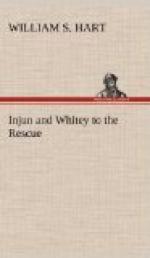During this Walt Lampson and Mart Cooley had been talking apart, and now Walt stepped forward. “This law business is all well enough,” he said, “but I got somethin’ t’ say about Dorgan.” He faced the crowd. “Lots o’ you fellers are cowmen, ain’t you?” he asked. Most of the men were. “When the Star Circle herd was stampeded by them white-caps,” Lampson went on, “an’ we got them sheepmen for doin’ it, Donald Spellman cashed in, but before doin’ so he told me who put up the job. It was this feller Dorgan. Him a cowman, an’ he turned ag’in’ his kind for money. Are we goin’ t’ let him get away?”
Henry Dorgan’s feeling of relief was gone, and he crouched behind Mr. Sherwood and Bill Jordan, white-faced with fear, as a loud “No!” came from a majority of the men. This turn of events caused a breach in the vigilantes’ ranks. The Bar O men stood by Mr. Sherwood, but some of the cattlemen from the Junction hated sheepmen more than they loved the law.
“Better give Dorgan up,” Walt Lampson advised Mr. Sherwood.
“No,” replied Mr. Sherwood.
A movement began in the crowd. Men ranged themselves on one side or the other. With the Bar O men and those left from the Junction crowd, Mr. Sherwood now headed about twenty vigilantes; they were outnumbered. The old cowpuncher, he of the Custer story, came and stood by Bill Jordan. It being evident that it would take a fight to get Dorgan, Walt Lampson stepped back and Mart Cooley took his place.
“Mart’s a bad hombre, boss,” Bill Jordan whispered to Mr. Sherwood. “You ain’t got no call t’ get killed. You better get out o’ this.”
“Are you going to get out, Bill?” Mr. Sherwood asked, and Bill grinned.
As this Western bad man and this Eastern business man faced each other, they represented not only violence against law, but something else—the old order against the new: the old order that survives only on the printed page and in the memory of man.
“Better give in,” Walt Lampson shouted from the crowd. “That skunk Dorgan ain’t worth sheddin’ blood for.”
“The law is,” Mr. Sherwood replied determinedly.
His courage seemed to make an impression on the mutineers, as moral courage usually does, but not on Mart Cooley, who was regarding Mr. Sherwood coldly. Mart did not reach for a gun. Your bad man never did—until the gun was to go into action. And there was this silent pause between the two factions, when a word would have meant bloodshed.
Whitey had ridden into the outskirts of the scene, unnoticed, and had seen his father facing Mart Cooley, the man who handed out death so easily and unerringly. As Whitey dismounted and staggered toward the center of the crowd, he was joined by Injun, who was standing near. Whitey’s face was ashen and his teeth clenched. He was not going to see his father killed if he could help it, though he had not the slightest idea how he could help it. Mr. Sherwood exclaimed angrily when he saw his son approach with Injun.




